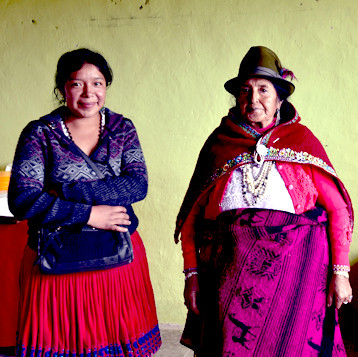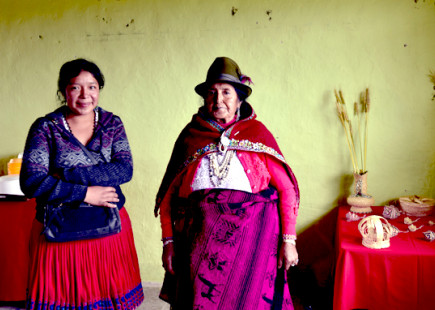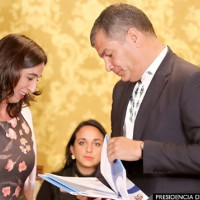Lenin Moreno - A new chapter for Ecuador?
Regions
As Ecuador’s new president, Lenin Moreno Garcés, gave his inaugural speech to the National Assembly members, and a number of invited Latin American presidents, an important question is what will change after the ten-year incumbency of his predecessor, Rafael Correa.

Ashish Kothari
Correa started in office as a critic of neo-liberalism, distancing himself from the IMF and World Bank, and setting up a constituent assembly to rewrite the 1998 constitution. Rights of indigenous people and nature were extended, while recognizing the concept of plurinationality as Bolivia had done, and there were high expectations of a new ability to include the formerly marginalized. For Correa, plurinationality referred to the coexistence of several different nationalities within a larger state where different peoples, cultures and worldviews exist and are acknowledged. Ecuador’s redistributive policies were admired, but these only lasted until the failure of the oil boom.
Correa then mortgaged Ecuador’s oil reserves to Chinese interests, and backed policies that favoured extractivism as the new cash cow for the state. Previous commitments to keep oil interests out of the Yasuni Reserve in the Ecuadorean Amazon were set aside in defiance of the interests of its indigenous inhabitants., particularly those in voluntary isolation. Large-scale mining was allowed to expand all over the country. Like South Africa, sub-soil resources are owned by the state, and ordinary people have found it difficult to resist the incursions.
Ecuador is about a quarter the size of South Africa, but the two countries are blessed with a mega-diversity of natural plants and other living species. Ecuador also has rich human and agricultural diversity. For thousands of years the indigenous people of the Andes and the Amazon have been the guardians of this diversity. Now their habitats are being appropriated by oil, mining and agribusiness interests. Because of their dependence on the natural world, their ancient means of survival are under threat.
The Correa government sought to defy the constitution and limit the autonomy of local indigenous peoples, who have enjoyed some congressional representation since the 1980s. By centralizing health and education, the state has trampled upon local efforts to develop multicultural education and health care. Indigenous value systems and initiatives have been starved of state resources.

Ashish Kothari
One community in the canton of Nabon, in the southern Azuay province, has been challenging these setbacks. It has been electing women mayors from the indigenous Patchakutik party for the past four terms of office. With banks refusing to set up in their area, the community has founded a successful credit union aimed at helping small farmers, artisans, women’s co-operatives and business people. It has encouraged people to feed themselves in the traditional way using homegrown products and done away with hunger in the community. Co-operative restaurants run by local women feed the community and tourists. The municipality has put emphasis on getting running water into each house and farm, releasing women from tedious hours of water collection over long distances. Use has been made of the plentiful agave plant, allowing local manufacture of a tequila-type liquor enjoyed throughout Azuay and further afield. ,
Nabon’s energetic mayor, Magali Quezada, clearly has the respect of the whole community. She has promoted young women to key positions on her team, but also helps the youth to honour the veteran community activists. She has battled central government, which insisted on 32 audits of municipal finances in an attempt to obstruct municipal progress. Central government also prevents indigenous education by insisting on conformity to the national syllabus which only pays lip-service to local languages and cultures, bypassing historic efforts to teach learners both in Spanish and Quichua, and, beyond language, in different cultural modes of living and understanding the world.
During the Correa government, indigenous leaders opposed the water and mining laws which privileged the corporations. Correa stopped indigenous people having a say in new development projects in their areas, and refused to allow this right to be enshrined in the Constitution. Ecuador provides no guarantees for indigenous representation in the Congress.
Unlike in South Africa, Correa stacked the Constitutional Court with loyal judges. This means that people don’t feel free to use the courts to get justice for their struggles against extractive interests. Judges who have ruled against government have also lost their jobs in recent years.
Once the oil revenues were depleted, Correa began a punitive hunting down of opposition indigenous leaders, members of the media, environmental groups and others. He was responsible for jailing 280 opponents and tried to close Ecuador’s main environmental group, Acción Ecologica, whom he once called "ecologistas infantiles" or infantile ecologists. He also tried to limit the autonomy of some of the country’s foremost universities on the grounds that staffs were increasingly critical of his regime.
Because of these authoritarian and pro-extractive positions, Correa sacrificed Ecuador’s progressive reputation in the world. Many who had seen him once as a beacon of the progressive Latin American left were forced to revise their opinions.
For these reasons, Pachakutik supporters had difficulty voting for Correa’s successor in the last elections. To keep Moreno out, they sided with his right-wing opponent. This enabled the ruling party, Alianza Pais, to accuse autonomous indigenous people of unprogressive behaviour. Moreno only gained power with a 51% result, which opponents questioned, but this was endorsed by the electoral authorities.
Correa’s legacy for Lenin Moreno is not favourable. The country is in terrible debt, oil and other commodity prices are at their lowest, dollarization continues at the expense of highly-priced exports, and there is only room for austerity measures. Moreno’s hold on the presidency is flimsy, and Correa is said to be waiting in the wings musing the possibility of a comeback. Moreno is also being much more conciliatory towards Correa’s former enemies.
Moreno is wheelchair bound after a shooting in 1997. He has been a fierce champion for the rights of the differently abled in Ecuador.
For his foreign minister he has chosen Maria Fernanda Espinoza, the country’s former ambassador to the UN in Geneva. Together with South Africa, Esposito has been promoting a binding treaty to regulate the behaviour of transnational corporations in relation to human rights. In both countries this seems to contradict mainstream policy supportive of the presence of large transnationals, and some Ecuadoreans feel it reflects a strange “double agenda”. It is not yet clear whether Espinoza’s move back to Quito will affect Ecuador’s support for this treaty.
Does Moreno represent a new chapter for Ecuador? He would have to undo Correa’s overriding commitments to mining, oil and agribusiness. Yet cabinet choices reflect more tolerance towards big business. For his oil minister, Moreno has selected Carlos Péres, a former Haliburton director, in an effort to get closer to oil interests. . Commitments to anti-corruption and transparency made in his inaugural address may not be sufficient to persuade his critics that he is capable of restoring progressive politics to Ecuador. Magali Quezada and her team in Nabon might find little respite in their local struggles.

